Commercial Real Estate Lawyer: What They Do and Why You Need One

All parties involved in commercial real estate transactions and investments should consult a commercial real estate attorney at times. Here’s a look at what these lawyers do, why investors need them, and how to choose one that’s best qualified to serve you.
What a Commercial Real Estate Lawyer Does
Commercial real estate lawyers specialize in the legal aspects of buying, selling, leasing, and managing commercial properties. They have extensive knowledge of local, state, and federal regulations, and are an invaluable resource for assistance with:
Answer a few questions and get custom mortgage quotes. We'll match you with offers from our network of 650+ lenders.
- Contracts: Commercial property lawyers draft, review and also negotiate contracts for their clients. These can be purchase/sale contracts, short- or long-term leases, investment group agreements and more. In the event of a contract dispute, lawyers can help negotiate settlements for their clients.
- Land Regulations: Commercial property lawyers help clients navigate zoning laws, land use regulations, and environmental compliance. They’re able to assist with federal, state and local regulations. They can also represent clients in zoning hearings, land use appeals, and issues with local authorities.
- Due Diligence: Commercial property lawyers regularly investigate titles when properties are purchased and sold. Hiring a lawyer can help ensure that there aren’t any encumbrances or defects that could hinder a transaction, and they can help best navigate any that should arise. They also can review surveys and other property documents.
- Loan Negotiation: There isn’t a one-size-fits-all commercial property financing solution, but each loan should be customized for the particular property and situation. Commercial property lawyers can represent clients during loan negotiations, and help applications move through the financing process.
Why You Need a Commercial Real Estate Lawyer
All real estate investors should have a commercial real estate lawyer that represents them. A lawyer is useful for several reasons:
- Navigation: Newer investors often aren’t familiar with the typical process of purchasing and financing commercial real estate, nor with negotiating tenant leases. Sometimes simply having a knowledgeable attorney who can guide you through the process is helpful in and of itself.
- Risk Mitigation: Commercial properties are significant financial investments, especially when six-, seven- or even eight-figure deals are being made. A skilled business real estate lawyer can help you identify potential risks related to a property, and provide solutions to mitigate them. These can include contractual, regulatory, title, financing and other risks.
- Representation: A business real estate lawyer can help you understand your rights and obligations in a commercial property transaction. They can also ensure that your interests are protected throughout the process, representing you when interacting with regulatory authorities, partners, lenders and others.
- Dispute Resolution: In the event of disputes, a business real estate lawyer can help you find a resolution and, if necessary, argue your case in court.
It’s important to have your own business real estate lawyer who specifically represents you. An investment group’s attorney represents the group, and not necessarily individual members of the group. You should have someone who can review documents, negotiate agreements, and resolve disputes while looking out for your specific interests.
How is a Commercial Real Estate Lawyer Different from a Residential Lawyer?
While both commercial and residential real estate lawyers deal with property transactions, there are key differences between the two. Even a good residential real estate lawyer probably shouldn’t be used for a commercial matter.
Commercial real estate transactions and negotiations are typically more complex than residential transactions, as commercial involves larger properties, higher financial stakes, and more intricate legal issues. Even the leases of commercial spaces often have more features than residential leases.
Because the transactions and leases are more complicated, negotiations for commercial real estate deals are inherently more complex than residential negotiations. Certain terms, financial arrangements and other details commonly found in commercial real estate transactions simply don’t frequently occur in residential dealings.
Navigating regulations, including zoning, land use, and environmental laws are much more involved than typical residential real estate issues. At most, homeowners might need to get a permit from a local zoning board. Commercial properties can require approvals and permits from federal, state and local agencies, and each permit itself is usually more complex.
Residential real estate lawyers simply aren’t well-versed in the nuances of commercial real estate. This doesn’t just pose an obstacle when reviewing what’s in permit applications and contracts — but residential lawyers might not even know what’s missing that should be in an agreement.
How to Choose a Commercial Real Estate Lawyer
When selecting a commercial real estate lawyer, you should evaluate criteria much like you would any other attorney.
At a most basic level, your chosen attorney should be experienced, available and communicative. You can check references and conduct an initial interview to gauge these criteria.
Your chosen attorney should also be well-versed in local laws and regulations, and in the particular type of property that you’re investing in. This might necessitate hiring a new attorney when pursuing properties in different jurisdictions, or when investing in a new type of property.
Take your time to check several attorneys, as choosing the best one for your situation can make everything go much smoother.
How Much Does a Commercial Property Attorney Cost?
The fees that commercial real estate lawyers charge vary depending on many factors, including complexity, the attorney’s experience and expertise, and the location, type, and value of a property. Some lawyers charge an hourly rate, while others may work on a flat fee or contingency basis.
Hourly rates for commercial real estate lawyers can range from $200 to $600 or more, depending on their experience and location. Flat fees can range from a few thousand dollars for simple transactions to tens of thousands for more complex cases.
Discuss fees and billing practices with a potential attorney upfront, so you have a clear understanding of the costs involved and can budget accordingly.
Wrapping Things Up
If you’re investing in commercial real estate, you should have a knowledgeable attorney on your side. Find a good commercial real estate lawyer, and you’ll be better positioned now and in the future for success.

